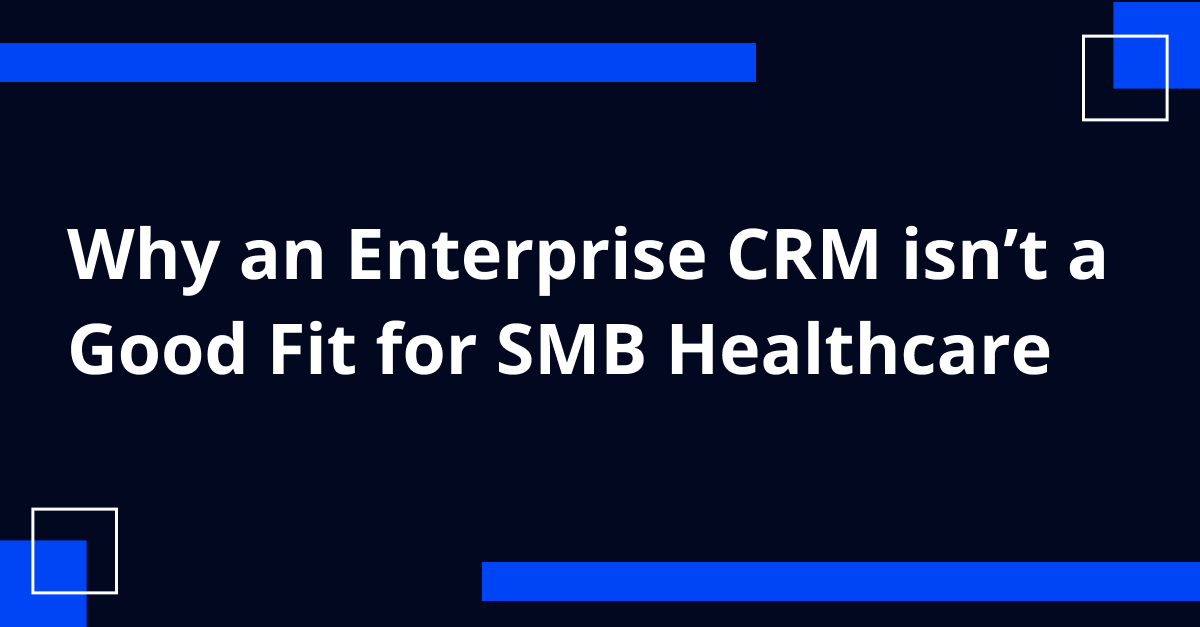Why an enterprise CRM isn't a good fit for SMB Healthcare
October 19, 2023

Today, we’re going to focus on the most notable enterprise CRM: Salesforce. Founded in 1999, Salesforce has become a behemoth and one of the industry leaders in CRM serving 150,000 businesses. [1]
What attracts so many executives, especially at enterprise companies, is that there are seemingly endless possibilities for the different ways you can customize their platform.
But, that comes at a price, typically, a big one… Not only from a pure software and consulting cost perspective, but also from the amount of time it takes to get the platform fully set up before launch.
In this blog, we'll highlight what considerations and challenges your SMB Healthcare business should be aware of if you’re thinking about purchasing and implementing Salesforce Health Cloud.
How many US SMB Healthcare practices and startups use Salesforce Health Cloud?
It’s not as many as you or I would think. While Salesforce doesn’t provide this specific data point, we used a few sources to work backward to this number. Statista reports that 3.1% of SalesForce customers are in Healthcare. [2]
For our purposes, we’re assuming that Small Practices and Startups aren’t included in the 65% of Salesforce Healthcare customers consisting of Hospitals, IT, Software, and Pharmaceutical companies.
So if we take 150k total customers * 62.1% based in the US [3] * 3.1% in healthcare * 35% of healthcare business * 89% business size (< 200 employees)
We’re left with just under 900, with an estimated 898 practices or healthcare startups directly using Salesforce Healthcare.
While all 230,000+ private practices in the US [4] certainly haven’t adopted a CRM solution yet, and many may never, Salesforce Health Cloud is likely used by less than 1% of all medical practices.
How much can you expect to pay?
As with about every question in this blog, it depends. If you’re using the product out-of-the-box and setting up the customizations and integrations yourself, Health Cloud pricing starts at $300 / user / month and can go up to $450 / user / month.
However, if you’re like 90% of SalesForce customers, you’re probably going to pay for implementation or some of their partner apps.[5]
Between customizations and integrations, data migration, implementation consulting, training, and support, a basic implementation could start at $5,000 and a more complex implementation could run you into the high $100,000s based on the size of your organization. [6]
While there’s a large variance between the costs for different businesses, Salesforce traditionally is one of the more expensive CRM options, especially for SMBs given the amount of customization and configuration that is available.
How long to set up and launch?
According to SP Tech, a SalesForce Enablement and Consulting company, it takes 100-150 hours for an out-of-the-box Salesforce Health Cloud implementation, depending upon your or your consultant's experience.
SP Tech then goes on to say that the final output/project, based on your business needs, might vary from 3 to 6 months for a mid-sized project. [7]
So while for a best-case scenario, you could potentially get up and running in a month, most businesses will take at least a few months. On either end of the spectrum, it’s certainly a big time commitment for you and your team.
How long does it take to train your team?
For this, I referenced the available courses and certifications offered by Udemy and Trailhead.
Udemy’s course provides 4 hours of video content and 2 exams whereas Trailhead’s course has an expected completion time of 8 hours.
While both seem to go a bit further into the technical weeds than some of your end users may need to go, their courses are a good barometer for ensuring your team understands the product.
Between the certifications and actually playing around with the product, you could probably expect your team to need a couple of weeks of training.
Is Salesforce right for your healthcare business?
Ultimately, this is up to you to decide. With Salesforce Health Cloud being designed for large healthcare organizations, you may find that it provides excess workflows, complexity, and bloat for an SMB practice.
Is there a better option?
If Salesforce isn’t the right fit for your businesses, there are lightweight CRMs like Tellescope that are specifically designed to serve SMB healthcare organizations.
Unlike Salesforce, Tellescope is affordable, requires minimal lift for implementation, and has workflows tailored to SMB healthcare.
Book a demo or fill out the form to learn more about how Tellescope can serve your business.
Originally published: February 27, 2023
Last updated: October 19, 2023